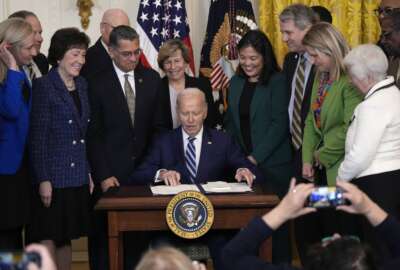What to expect as the contentious Congress gets underway
"We'll have to see what the new administration wants and what Congress does in the spending bills," said Bloomberg Government Deputy News Director Loren Duggan.
They managed to get a speaker elected without too much drama. Now the 119th Congress has to get down to real business. For what to expect first, the Federal Drive with Tom Temin turned to the Deputy News Director of Bloomberg Government, Loren Duggan.
Interview transcript:
Tom Temin This really had a lot less drama, I think, than people predicted. A couple of votes, but really no drawn out, horrible affair like the last time around.
Loren Duggan Right. The last two times, both the 2023 version and then the September version when they had to replace him. But Mike Johnson is now speaker of the House. He got the votes of enough people. They had to hold a vote open, talk to some folks, persuade them to change their mind, and they got there. So he will be speaker of the House and responsible — with a very narrow majority: 219 to 215 right now — for getting President-elect Donald Trump’s business through the House and then working with the Senate to get stuff done. So a lot of this, they got there, but it foretells some of the kind of really strong maneuvering he’s going to have to do to get things through over the next several months.
Tom Temin Yes. And we don’t really know precisely what the Trump business will be because most of the things that Trump has talked about are administrative changes and executive orders. As far as landmark legislation, I guess, what, maybe the tax bill would be something? There’s legislation needed to extend the current tax situation.
Loren Duggan That’s always been viewed as the Super Bowl of legislation for this year by lobbyists, by people who are trying to get things through. These provisions expire at the end of the year. They have to do something about them or else a lot of individual taxes and escorts and pass through businesses, their taxes would go up. So this is a natural time to take a look at the tax code, take into account some of the things that Donald Trump promised on the campaign trail and then what members want to do. So that’s going to be the big thing. But before that, there’s a lot of talk about doing legislation to support the President, especially in things like immigration and what he’s talked about with potentially mass deportations or rounding people up. They may need some funding to do that. So I could see that being an early days priority in addition to some of the standard fare that Republicans want to pursue.
Tom Temin Right, funding and also the statutory language necessary to do what they want to do, say, on immigration. It could be seen as interpretive at this point, but if there’s a new law that they can get through both houses, then it would be an easier basis from their point of view, the Trump administration point of view.
Loren Duggan That’s right. And some of this funding could be done. You’re going to hear the term budget reconciliation a lot, both in context of tax, and with this, there’s been talk about using these expedited procedures, get funding through quickly in a process that only requires a simple majority in the Senate, which they have a 53-47 majority there. So anything that doesn’t require 60 votes would be easier to get that through, especially to make things happen quickly.
Tom Temin Right. No mention of what might be done legislatively and if anything, for Schedule F, that special class for the high level federal employees that are now career civil servants. Congress tried to bar Schedule F legislatively. That never happened. Any talk yet of trying to enact it legislatively?
Loren Duggan I haven’t heard that, but maybe there will be. I think the easy first step is to just revive or maybe revive with some revisions what the Trump administration did in 2020 right before they left office. So I would think a first step might be put that in place that way and then maybe work with this Elon Musk, Vivek Ramaswamy entity, which is called the Department of Government Efficiency. They’ve talked about ways to look at federal staffing and [return-to-office (RTO)] and other issues like that. So I think we will see probably the executive stuff quickly. And then maybe some follow-up legislation as Congress thinks about how it wants to deal with those issues.
Tom Temin And of course, before Christmas, there was the continuing resolution, which goes to, what, March 14th, I believe? So that’s not a ton of time. And will the Trump administration, as it takes office in a couple of more weeks, try to change the content of what might be the 2025 year appropriations that are now based on the Biden administration’s request?
Loren Duggan Well, the negotiating teams there are Republican House, Republican Senate, Republican White House now, as opposed to Democratic White House, Democratic Senate and Republican House. So that will instantly change the dynamics there. You will still need some Democratic input to get that package through the Senate. So I would think that at that tier some of the balance has changed, but in the end, you’re still going to need something at least somewhat bipartisan to get done by March 14th. I would expect some Trump administration priorities there. And then maybe they’ll look at broader spending cuts and longer term spending cuts through other debates, especially around the debt limit, which came up in the context of the continuing resolution, wasn’t dealt with but needs to be dealt with sometime in this first kind of maybe five, six, seven months of the year.
Tom Temin And some of the grandiose schemes have talked about, say, doing away with the Cybersecurity and Infrastructure Security Agency or moving the Transportation Security Agency to the Transportation Department and otherwise kind of chopping and reconstituting [the Department of] Homeland Security. But that’s the way it’s constituted now, is all statutory, which means that would take legislation; that seems like a heavy lift at this point.
Loren Duggan It does. You could see maybe some of these committees taking a fresh look at it. The Homeland Security Department hasn’t been reauthorized since it was created and might be overdue for a look like that. They’ve added to it and reorganized here and there. But you could see maybe some interest in changing how that department operates. But a lot of people, whenever there’s a DHS issue, get involved, a lot of committees and there’s a lot of turf to defend from different committees. So it’s not a done deal. And maybe if they want to, it’s something they’ll work on over the course of the year.
Tom Temin The other burning issue left over from the Trump administration, first time, which was left over from the Biden administration, which goes back I don’t know how far and that’s the FBI headquarters. And there is money for, I believe, site work, but not actually acquisition yet of the property where it’s going to go in Prince George’s County. So the FBI better wonder if it’s going to ever get out of that horrible building they have now down downtown in D.C.
Loren Duggan There may be a chance to ask Kash Patel, who’s the nominee for the FBI, what he’d like to see happen, and probably part of the broader debate that would go on with some of the nominees. And as they figure out what to do if if they want to move agencies out of Washington more broadly, I don’t know if this will be one where that debate will be renewed, but certainly there’s a lot of interest from lawmakers on that.
Tom Temin Yeah, but that specific one, there is authorization for [the General Services Administration] to move ahead on, but not the money yet. So there’s a chance to reverse that at this point. And then the last time Trump wanted to have them move out temporarily and rebuild on that site.
Loren Duggan Right. So we’ll have to see what the new administration wants and what Congress does in the spending bills that they, like you say, they have to write those by March 14th. And that’s always an opportunity to to reopen debates that even seemed settled at one point.
Tom Temin And what else will they do, do you think, immediately starting this week?
Loren Duggan Well, a lot of action on Monday will be focused on the electoral count, formally making Donald Trump President and counting those votes from around the country. And then the ceremonies for President Carter are going to take up a lot of time. He’s going to lie in state from Tuesday through Thursday, lawmakers will be going to ceremonies and probably the state funeral. So that will overshadow it. But they do have a few bills they’ll try to get through and start the process of dealing with the nominees that President Trump will send up, maybe start holding hearings that week after this. But that’s kind of the early start here. We’ll see where they get going on that.
Copyright © 2025 Federal News Network. All rights reserved. This website is not intended for users located within the European Economic Area.
Tom Temin is host of the Federal Drive and has been providing insight on federal technology and management issues for more than 30 years.
Follow @tteminWFED






